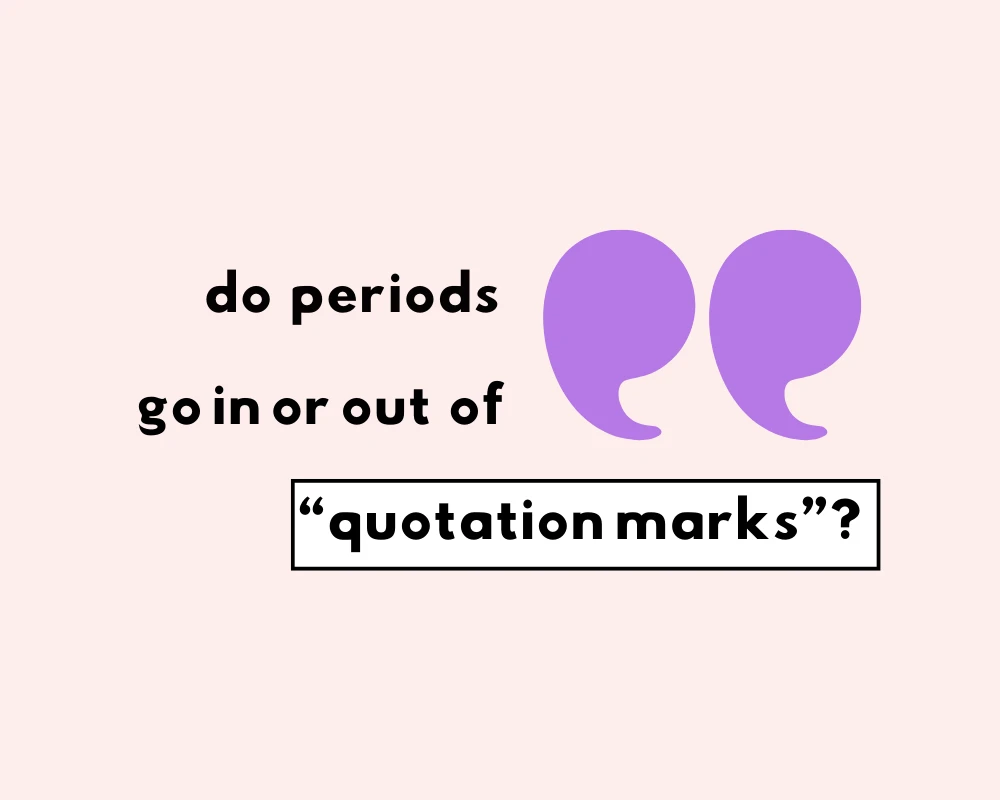Contents
Toggle
Periods inside or outside of quotation marks?
Does periods go inside or outside quotation marks? What about commas? What if you have single and double quotation marks in the same sentence? Why are there so many questions related to punctuation and quotation marks? Why is English punctuation so complicated!?
Fear not, curious grasshoppers, we address these questions on the use of punctuation with quotation marks in this article.
Back to the basics: what are quotes, again?
Quotes are used to show that certain text (the text within the quotation marks) are repeated or reproduced from a passage or phrase from a novel, article, song or any other outside source.
When material from an outside source is used in another piece of writing, we use quotation marks, (which look like a pair of upside down teardrops ” ”) to show that the text within the quotations are not the author’s own, but belong to the other referenced source. This is extremely important to do, especially in our own writing (otherwise you may be accused of plagiarism, which is a big no-no!)
When should you use quotation marks?
Include quotation marks in writing when citing:
- Direct speech or direct quotes, (which is the text word for word or verbatim).
- The titles of certain texts and works.
- To imply an ironic or figurative meaning of certain words.
Quotation mark rules!
As with most forms of punctuation, there are rules to use quotation marks correctly. When it comes to the rules of English punctuation, there are two major style guides that are standard: British English and American English.
While overlaps exist between the two, each has their own writing conventions and idiosyncrasies on the correct use of punctuation, including the inimitable quotation mark. So, the first order of business is determining whether you are writing using British or American English. In general, most of the world follows British English conventions, with the exception of the United States and sometimes Canada.
American style
The American style convention, broadly speaking, is to include periods and punctuation inside quotation marks. This is known as the American style of punctuation. For example:
She said, “I’ll be there at 2:00.”
The book is titled “The Great Gatsby.”
He asked, “What time is the meeting?”
There are exceptions in American English where the period may go outside the quotation marks, or other forms of punctuation are called for where quotations appears in the beginning or middle of a sentence.
For example, when the quoted material is a fragment within a sentence, and the sentence continues after the quotation, we typically place a comma instead of a period at the end of the quote (inside the quotation marks!) See the examples:
She told him, “I’ll meet you at the corner of Elm Street and Maple Avenue,” but he never showed up.
“The house is haunted”, said the creepy undertaker.
“Call me when you get there,” said Melissa.
In British English, the rules for using punctuation with quotation marks differ from those in American English. The standard practice is to place periods and commas outside of quotation marks, unless the punctuation is part of the quoted material:
She said, “I’ll be there at 2:00“.
The book is titled “The Great Gatsby“.
He asked, “What time is the meeting?”
Punctuation is placed inside the quotation marks when they are part of the quoted material, for example in dialogue or the title of some work.
She asked, “Do you remember the movie ‘Casablanca’?”
He said, “The term ‘eureka’ means ‘I have found it’ in Greek.”
The rules still may vary depending on your regional or style guide preferences, so be sure to consult the specific style guide you’re using, and be consistent with the style you choose to follow!
Keep on learning! It’s encouraged.
- Active vs. Passive Voice (Explained, With Examples)
- When to Use ‘Weren’t’ or ‘Wasn’t’? A Guide
- What’s Subject Verb Agreement? (Rules of Subject Verb Agreement)
- When to Use ‘A’ or ‘An’ (What’s an Article?)
- What is the Past Tense? (Forms of the Past Tense)










